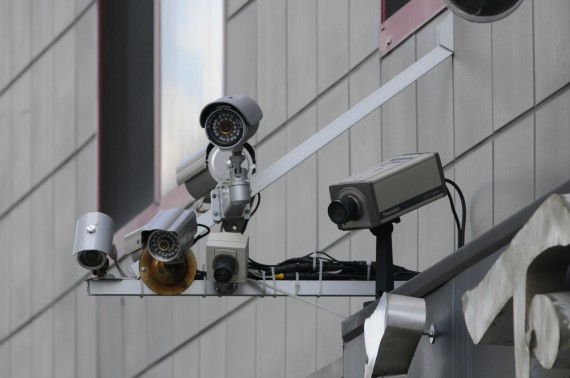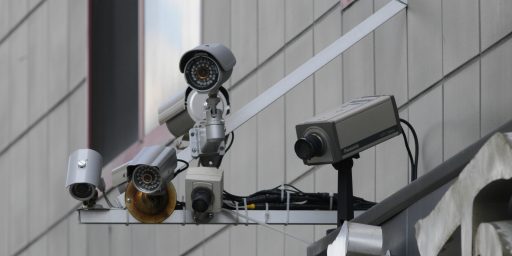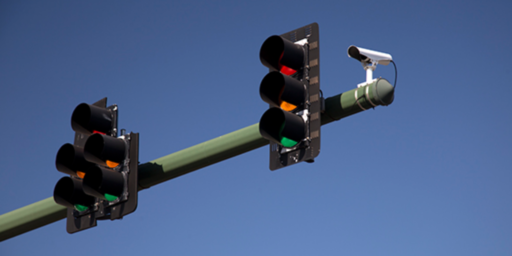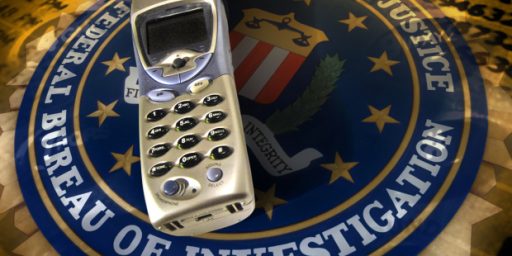Is Technology Making It More Difficult To Protect Individual Liberty?
In a new column at PJ Media, a take a look at the extent to which individual liberty has come under threat thanks to advances in technology:
Recent revelations about the National Security Agency amassing massive amounts of data ranging from cell phone records to Internet activity to credit card transactions have, quite rightfully, led many Americans to become concerned about the extent to which our civil liberties are being eroded by government monitoring in the name of “public safety.”
Of course, the government has been engaged in data collection for quite some time. As James Bamford first detailed in his classic 1983 book The Puzzle Palace, the NSA has been engaged in the practice of collecting data for decades now. Theoretically, the agency’s mission was, and indeed still is, supposed to be limited to collecting data on communications between people in the United States and people in foreign nations, especially nations that are potential adversaries of the United States. In reality — even 30 years ago when we were all still communicating via hard-wired telephones and the Internet was still not much more than a research project at DARPA that had begun connecting American universities together — the signals intelligence that the NSA was collecting inevitably ended up including purely domestic communications.
(…)
All of this leaves us with a rather important question: are we at the point where technology is outstripping the ability of current laws, and the Constitution, to protect the civil liberties and the privacy of American citizens?
In many important respects, the answer to this question is yes. Take public surveillance cameras, for example. After the bombing attack in Boston, it was through the use of public surveillance cameras that authorities were able to identify the “persons of interest” that we eventually learned were the Tsarnaev brothers. In that particular case, the cameras in question were nearly all under the control of private companies using them for building security rather than surveillance, and in that situation the Fourth Amendment doesn’t apply at all. Even in the case of wide nets of government-run surveillance cameras, the law places virtually no limit on what authorities can do with them.
More at the link.







That’s not an important question. It’s a stupid question.
Wanna protect your liberties?
Hang up your damn phone. Stay off the intertubes.
It’s not technology at fault…but peoples addiction to technology.
You don’t need to be sharing your every thought on twitter, or facebook, or whatever.
And if you do…it’s tantamount to standing on a box in Times Square and sharing it with absolutely everyone.
Yes, and I want to do it while still living in the 21st century. Forgoing cell phones & the internet is not really an option.
@Sam Malone: I think Doug’s question still stands up even if we’re talking about people who do only the things one needs to do to function in modern society–working, making phone calls, banking, paying bills, shopping–all the “regular” stuff we do before we even start dealing with social media and e-mail.
To paraphrase…er, someone: You may not be interested in technology, but technology is interested in you.
When did libertarians decide that liberty and keeping all of your communications private, regardless of where they take place, are the same thing?
Are you really any less free as a result of the NSA having a huge database of phone call records? This isn’t a question of liberty, but one of privacy. Those are different things.
Privacy: Gone.
Liberty: Remains to be seen.
There is overlap between the two.
Spoken like a true addict.
Life is about compromises.
You want to carry a phone around with you every second of everyday…you compromise your privacy. You want to get on a plane…you compromise your freedom. Want to rush through a toll gate…that Freepass will steal some of your liberty. You want a bargain on groceries…swipe that membership card and lose a bit more of your precious privacy.
Only in that fantasy land called libertarianism is absolute privacy possible. And it’s made possible by little drops of Unicorn tears.
@mantis:
Clicking the little up-thumb didn’t seem enough for this. I’ve gotta say, you hit the nail on the head. Yeah, in the long run, loss of privacy could endanger liberty, but if you’re to define liberty as “that which we are able to do”, then technology has given us liberty we couldn’t have dreamed of.
On one side of the scale we have the internet, which is to say instant access to virtually all of human knowledge at no cost. Plus the ability to reach out and obtain any object we can afford from any place on earth. We also have cell phones which allow us to communicate from anywhere, to anyone, while always knowing our precise location, and being able to listen to music and play solitaire.
On the other side of the scale we lose privacy.
This is like the easiest choice ever. This is why I’ve been saying for days now, during this entire PRISM affair, that we need to understand that this how the world is. This is the choice we’ve made. It’s 2013, not 1913.
I can’t wait for when almost everyone is running around wearing Google Glass and whatever Apple’s and Microsoft’s copies will be called, filming everything and sending it to Mountain View, Cupertino, and Redmond…
Because that will be the future.
And there will be nowhere to hide.
Doesn’t mean that your liberty will be gone though.
There’s a rather different take on the subject here:
http://jeremykun.com/2013/06/10/why-theoretical-computer-scientists-arent-worried-about-privacy/
You are not making a lot of sense. I pretty much need my cell phone to function in my business life, to say nothing of three relatives who depend on me that might have a health emergency at any time.
Where I live, fastpasses are quickly becoming the only method of crossing bridges, and talking the long way around to reach SF or Marin is not really an option. And, once again, flying is a necessity in my business life.
So if your point is I am addicted to being a functional adult with a professional life, and a guy who takes care of his family responsibilities in the year 2013, then the answer is yes.
Where did I mention “absolute privacy”?
@ PJ
There is not a direct cause and effect relationship, no. But that does not mean there is no cause for concern and some vigilance, of that we should simply say C’est la vie, and forget about it.
I’m not surprised about what’s going on now, nor am I particularly alarmed about it. But we need to let the folks in DC know that we are keeping an eye on them, just as they are keeping an eye on us.
@Sam Malone:
Well, my family and friends live all over this and several other countries. So now I’m not allowed to call them on the phone to catch up, or fly to visit them, without surrendering my license to complain about being spied on? I have to give them all up and never see or speak to them again?
Anyone ever read Darkness at Noon? This is Rubashov’s “theory of the relative maturity of the masses” at work.
When you walk out into the open air beyond your domicile and shout, you disturb air molecules with vibrations caused by the force of your shouting. Your very presence deforms the universe to some extent, and registers to others capable of sensing it. It’s been this way for a long time.
The only difference nowadays is we have created delicate instruments with which to measure that deforming presence, and created technological vehicles to amplify that presence to others. The two occurrences of you doing something and someone else noticing are just colliding more often.
Take my example, and become a recluse.
@Tillman:
Well that’s just, like, your opinion, man.
@Rafer Janders:
Well that’s just, like, your opinion, man.
Win.
You do realize the cell phone is a fairly recent development, right?
How did you survive before?
You’ve become dependent on your phone…addicted.
Technology and technology takes away.
If you are really concerned about privacy there are plenty of tools out there that would allow you to encrypt your emails , conceal your Internet browsing history and in various ways hide your presence on line. You don’t have to be on Facebook and Twitter or comment on Internet forums. Use paper maps. Write letters. Use only dumb phones. Cash only.
Get off the grid, man. Do the full Repairman Jack.
Of course, most people aren’t going to do that. Its a lot easier to give up privacy in return for convenience. You strike a balance by being aware of the privacy issue and using tools to keep things private that need to be kept private.For example if you want to carry out an affair, maybe the two of you need to learn PGP and not use your primary cell phones.
@Sam Malone:
Two technologies that I know of negate the whole idea that this is a voluntary transition.
One is face recognition cameras, the other as auto license-plate recognizing cameras.
In both cases you do what people did for a long time. What’s new is that a tireless robot can note their appearance in a time and place and log it in government databases.
@john personna:
Two technologies that I know of negate the whole idea that this is a voluntary transition.
They don’t “negate the whole idea.” If the government starts using face recognition cameras in public places, then you are correct that is not something the public is effectively accepting through their behavior. This does not change the fact that they do so with most other technologies that are not very private, a fact that many are now blaming on the government out of stupidity.
@mantis:
I don’t even know where you are coming from. The info I have is that face cameras and car license cameras are in use.
How does that not negate the idea that people *choose* to give up their privacy in this new survellence state?
At best your argument is that a *subset* is voluntary, but removing the subset does not remove the whole.
There is no opt-out, unless you want to walk everywhere in a burka.
@mantis:
Is your deal that you are trying to straw-man the whole thing as a voluntary and knowing transition by citizens, benefits for lack of privacy?
Obviously citizens are not making informed choice. Most of them do not understand the methods now used, let alone their pervasiveness.
@john personna:
The info I have is that face cameras and car license cameras are in use.
I don’t dispute either, though I haven’t heard about automated facial recognition cameras that you describe being in use. If you are aware of government facial recognition cameras that “note [people’s] appearance in a time and place and log it in government databases,” please share that.
Presumably you are talking about public areas. There is no reasonable expectation of privacy in public areas. Please explain what the difference is between a police officer noting your license number and location and a police camera doing so. I don’t see the difference, but then I don’t have an irrational fear of technology.
In addition, law enforcement have been using facial recognition software on video evidence for many years. They haven’t been doing so in the automated fashion you describe, but they’ve been doing it. So it seems that your problem is the possibility that the government will automatically capture everyone’s face (everywhere?) and will somehow be able to match that face with an identity (how?) and log your movements in a database (to what purpsose?). Again, unless you can show that the government is in fact doing something like this, then you are just trafficking in fairly paranoid speculation.
So really, I have no idea where you are coming from. It seems like you are fine with video surveillance, but not facial or license plate recognition. You seem fine with law enforcement noting your presence somewhere, but only if it is a person and not a video camera and a computer. And you seem to have a rather foolish notion that we have privacy while in public areas.
In any case, the existence of video surveillance in public areas does not “negate the whole idea” that people knowingly or tacitly accept that records of their electronic communications are recorded. That was your claim.
@john personna:
Is your deal that you are trying to straw-man the whole thing as a voluntary and knowing transition by citizens, benefits for lack of privacy?
Huh? I don’t understand the question.
Obviously citizens are not making informed choice. Most of them do not understand the methods now used, let alone their pervasiveness.
So is your argument that law enforcement should only use methods that all citizens understand? That’s a tough sell. A lot of people are stupid and/or ignorant.
@mantis:
My position is pretty simple. Citizens do not understand the degree to which a surveillance state has been established. They do not in fact understand how often or how easily their routine actions are “databased” for future use.
If they did, they might take stronger political action.
On the other hand, you seem to be making the demonstrably false argument that citizens know full well that when they go for a walk or a drive etc. etc. they will be logged and recorded, and that they nave knowingly accepted that change.
(Did everyone here in this thread know that license plate recognition cameras were cheap and in broad use?
I’ve heard that police car dash cams routinely log every car they see on a drive.
Does everyone know that?
Did everyone make an informed choice about that, or did it just happen?)
@john personna:
On the other hand, you seem to be making the demonstrably false argument that citizens know full well that when they go for a walk or a drive etc. etc. they will be logged and recorded, and that they nave knowingly accepted that change.
No, I am not making that argument, and I don’t seem to be. I’m admitting that lots of people are ignorant. What else is new?
By the way, you have in no way demonstrated that everyone is being “logged and recorded” when they go for a walk or drive.
Anyway, you seem to be making the argument that the government is already performing any surveillance you can imagine as possible, and that the government should not be doing anything unless every citizen is aware and approves.
You also conflate walking or driving on public streets and sidewalks with engaging in electronic communication using the services and networks of private companies. These are different things.
@mantis:
So you are not even that informed. Example:
Seriously. You are arguing for a surveillance state that you do not even understand.
BTW, could you use a more bullshit word than “conflate?”
Of course I’m “conflating.” That is what big data is all about. Your car’s position and everything else that can be logged is “conflated” and analyzed.
@john personna:
So you are not even that informed.
Just because I ask you to back up your claims does not mean I am uninformed. You assume far too much about others with far too little information. In fact, you seem to do that about a lot of things. I have not once disputed that automated license plate recognition is in use, and specifically said I did not dispute that.
Anyway, here was your claim:
when [citizens] go for a walk or a drive etc. etc. they will be logged and recorded
That is extremely broad, and you haven’t shown that to be true. It is true that in some municipalities, in some areas of town, there are cameras recording license plate numbers. These efforts vary in their execution. Some are logged and some are just cross-checked against plate numbers that police are already looking for.
Of course I’m “conflating.”
Fine. If you don’t give a shit about making a coherent argument, it’s your choice.
I have made two major points here, neither of which you seem to care about addressing. First, electronic communication using the services and networks of private companies is a completely different thing, legally and practically, from being physically out in public areas on foot or by car. Second, you have no reasonable expectation of privacy while in public.
A third point would be my arguing against the notion that because some citizens are ignorant of what the government is doing, the government shouldn’t be doing it.
If you actually feel like addressing my actual points, and not just making some up for me, let me know.
@mantis:
Reading critically, you have an argument that is both illogical and immoral.
Illogical because you claim this is all an informed choice, when you are not informed.
Immoral because you call the average citizen a “moron” and say he doesn’t have a right to know anyway.
Go ahead … distance yourself from the position you’ve made.
@john personna:
Illogical because you claim this is all an informed choice, when you are not informed.
I made no such claim, and I am informed. Wrong on both counts.
Immoral because you call the average citizen a “moron” and say he doesn’t have a right to know anyway.
I never said the average citizen doesn’t have a right to know. You lie again.
Go ahead … distance yourself from the position you’ve made.
You mean the one you invented for me? Whatever asshole. Argue with the strawman you’ve created, since you clearly have no interest in arguing with me. I’m not bothering if you are just going to lie about what I’ve said.
@mantis:
Do you think your little dance, with:
Fooled anyone?
Do you think your constant lying about what others say is fooling anyone?
You can make this argument about any aspect of our modern society. Yep, I addicted to interstate highways, my blood pressure meds, my car that has 6 airbags that is 8 years old and still 30K from needed a tuneup, etc. etc. Innovations rapidly become necessities. Of course I suppose I could drive a ’38 Packard…
Sorry, but a cellphone is a necessity to function in the year 2013, it’s not an indulgence. Same with a fastpass where I live. Or is your point that if we really want liberty we should move to a unibomber shack somewhere in the woods?
@mantis:
I just documented a lie, and then an absurd cover-up. You claimed you weren’t demanding I prove something to you, that you knew it anyway, and wanted we to say it because … bullshit.
@john personna:
You claimed you weren’t demanding I prove something to you, that you knew it anyway
You are lying yet again. You just can’t stop, can you.
If I ask you to support your claims, that does not mean I am ignorant of the facts. Learn some logic, lying asshole.
@mantis:
Are you insane?
When does anyone demand that anyone else “prove” a common point of reference?
You would only ask that if you didn’t believe it, and thought you would gain points by proving the negative.
@john personna:
When does anyone demand that anyone else “prove” a common point of reference?
When they are dealing with a dishonest character, for one.
You would only ask that if you didn’t believe it, and thought you would gain points by proving the negative.
Incorrect.
I’m aware of the technology and some places it is used, but you made an overly broad claim that I asked you to support. You did not support it, and opted rather to tell me how misinformed I am about the technology and its use. I am well aware of the technology available and in use, but I don’t believe your claim that all movements of citizens are being documented by the government. You have not in any way supported that claim.
You do this a lot. You make overly broad claims, and then when you get called on it you invent strawman arguments for those who disagree, and then dishonestly continue to lie about others’ arguments and their motives. You are, quite simply, a dishonest person, intellectually and in other ways. Hope you’re proud of yourself.
Now you are lying completely, and trying to double back to the point we’ve covered.
I said that people can be identified as they walked or drove. I showed you a town where they are tracked as they drove.
Dishonest much?
(Note that license plate cameras are really cheap. You can buy dozens of brands on google-shopper. Of course they are being rolled out further and further as we type. Facial recognition is also spreading, that is easy to google-news.)
How Face Recognition Tech Will Change Everything
@john personna:
Now you are lying completely, and trying to double back to the point we’ve covered.
No, I am not.
I said that people can be identified as they walked or drove.
No, you said they will be. Here’s what you said:
when they go for a walk or a drive etc. etc. they will be logged and recorded
They will be logged and recorded when they walk or drive. This is an overly broad claim, as I have already stated. Some citizens in some locations may have their license plates recorded by automated systems. Some citizens in some locations may be on video surveillance. These are both true statements. I would not dispute them. That’s not what you said though.
You also haven’t shown any evidence to suggest that the government is using automated facial recognition technology and logging our movements with it, even though you made that claim.
Facial recognition is also spreading, that is easy to google-news.
If you had any evidence, you would provide a link to it. The link you provided only shows what I already said, that law enforcement uses facial recognition software on video evidence. That is not an automated system picking faces up off the street, identifying them and logging the individuals movements, as you claimed.
@mantis:
That’s amazing. You are actually building a strawman that if a surveillance state is not complete and everywhere, it is not growing or real.
Cape Girardeau [Missouri] police use cameras to collect license plate numbers
Did you get that? A Missouri town logging automobile times and locations in a national database?
Not even one limited to the NSA?
One that “only law enforcement can access?”
As if that is a small group.
@john personna:
You are actually building a strawman that if a surveillance state is not complete and everywhere, it is not growing or real.
Just because I dispute your overly broad claim does not mean I deny the actual facts, just your distortion of those facts. I have not disputed in any way the use of automated license plate recognition. Nor have I made any claim about a “surveillance state” one way or another.
I have a busy rest of the day, but you don’t need to me to continue to argue against what you imagine I’m saying anyway. You can do that all by yourself.
First off, there is no such thing as a “facial recognition camera,” i.e. a camera that recognizes your face as it is recording you. Footage from a normal camera can be subjected to facial recognition software after the fact.
Second, you two have fun burning your respective strawmen. Hilarious stuff watching two people fail reading comprehension, or at least twist words and meanings around.
Otherwise, the real issue people have with technology used in law enforcement is that it allows a few policemen to do the work of hundreds, without the pesky human errors of forgetfulness or lack of vigilance. However, it’s been the case with technology from the beginning to reduce the workload of those who employ it and allow them to do their jobs better. I do believe people have a naive expectation of privacy, and don’t expect their leisure-gadgets or mode of transportation to be reporting on them. mantis would call them moronic for not thinking it through, I’d stick with naive. However, I find no issue with people’s expectations being wrong, since that tends to be the rule of the day.
Again, Darkness at Noon. Theory of the relative maturity of the masses. I harp on about it enough, but here’s the section of the book it’s from if anyone’s interested. john personna’s bit about there being greater impetus for political action if people understood is pretty much straight from it.
@Tillman:
So you choose a different strawman?
Facedeals checks you in with facial-recognition cameras
The term passes the Los Angeles Times style-guide.
@mantis:
Your problem is a logical one. In order to discount all my examples of facial recognition, and license plate recognition, in use, you really need to pair that with an assurance.
You can only say these examples don’t add up if you can name some barrier to proliferation.
And not that they’ll simply spread as they become cheaper and more reliable, in a classic technology adoption scenario.
@john personna: First, I don’t take arbitration from journalism style guides unless I’m writing for them. Which I don’t.
Second, isn’t that basically what I described? The app uses video footage and compares against a Facebook or app profile. It’s not the camera doing the “recognizing.” I’ll admit it’s a fairly miniscule philosophical difference.
@john personna:
Your problem is a logical one. In order to discount all my examples of facial recognition, and license plate recognition, in use, you really need to pair that with an assurance.
I did not intend to “discount all [your] examples of facial recognition, and license plate recognition.” I disputed your overly broad claim. I’ve explained this several times but you can’t get it through your thick skull.